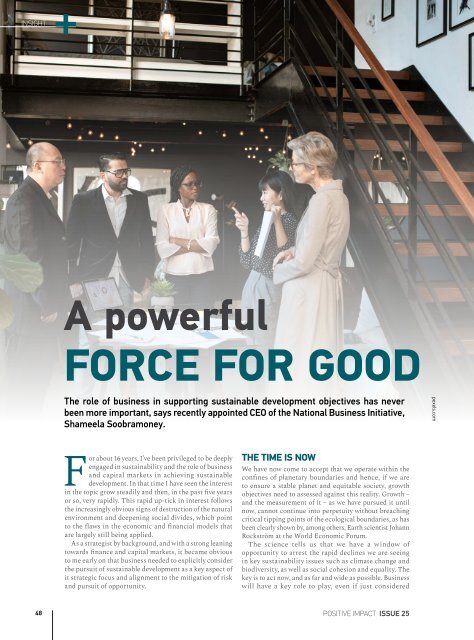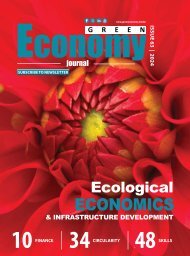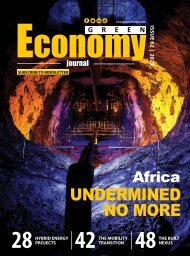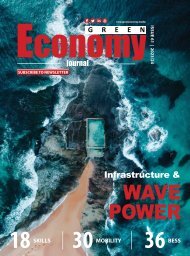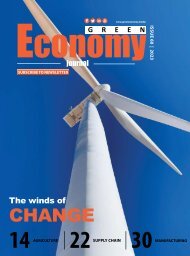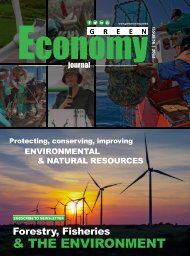+IMPACT Magazine Issue 25
Create successful ePaper yourself
Turn your PDF publications into a flip-book with our unique Google optimized e-Paper software.
INSIGHT<br />
INSIGHT<br />
A powerful<br />
FORCE FOR GOOD<br />
The role of business in supporting sustainable development objectives has never<br />
been more important, says recently appointed CEO of the National Business Initiative,<br />
Shameela Soobramoney.<br />
pexels.com<br />
from estimates on how much financing is needed to<br />
achieve the Sustainable Development Goals (SDG) 2030<br />
agenda. Estimates vary as being between US$3 trillion<br />
and $5 trillion needed per year, beyond what is already<br />
being spent. This will have to come from private capital.<br />
For this reason, the role of business in supporting the<br />
achievement of the aims of sustainable development has<br />
never been more important.<br />
This is where I believe the NBI can play an even<br />
bigger role in helping drive collaborative action for the<br />
achievement of sustainable development, encompassing<br />
environmental and social sustainability while creating<br />
value. Many companies are undertaking their own<br />
commendable initiatives, no doubt. However there is<br />
much to be gained from the multiplier effect that collective<br />
action can have. Obvious immediate benefits can come<br />
from economies of scale and leveraging a solid base, rather<br />
than each entity doing a little and replicating structures<br />
in their own contexts.<br />
My focus will be on “the art of the possible” and by this,<br />
I mean that we need to look at the world and business<br />
models using a lens of what sustainable models can look<br />
like – and then make a set of no-regret decisions now,<br />
which can help get us on that pathway. I am under no<br />
illusion that “business as usual” is unlikely to change<br />
overnight, and there are many entrenched perverse<br />
incentives and short-termisms that will require an entire<br />
systems change to shift.<br />
DRIVING SYSTEMIC CHANGE<br />
However, if we have a view of where we can go, we have the<br />
opportunity to use that vision to drive current choices. If we<br />
know that the way of the future is circular and regenerative<br />
systems, then what are the things we can do now that are<br />
on the path to those models? How do we balance these<br />
against the current realities we face as a country with<br />
rampant unemployment, inequality and poverty? It is<br />
the answering of these questions that I intend to make<br />
my focus at the NBI. We can provide the knowledge base<br />
that can inform actions and recommendations for policy<br />
and other systems changes, and we provide the practical<br />
“on the ground” implementation projects that facilitate<br />
collaborative action to drive systemic change.<br />
The NBI is home to the ground-breaking Just Transition<br />
Pathways project that was derived from an intense multistakeholder<br />
consultation process, and which offers<br />
pathways to net zero for every major sector of the economy.<br />
It makes the case that we can have a transition that is net<br />
jobs-positive if we make the right choices now. There<br />
is the opportunity to seed new industries aligned with<br />
a low-carbon future that both create jobs and make the<br />
country more competitive globally. The aim is to find<br />
implementable projects that bring the recommendations<br />
to life, and some of these are underway.<br />
TOWARDS A RESILIENT,<br />
RELEVANT ECONOMY<br />
Closely tied to this is the work under the Economic<br />
Inclusion team of the NBI towards creating meaningful<br />
job opportunities for young people. The focus is both on<br />
immediate jobs to alleviate the very serious impacts of<br />
unemployment, as well a longer term view on green jobs.<br />
This work also focuses on SME development and has<br />
a cross-cutting impact across the other NBI work streams.<br />
The Technical Assistance Maintenance and Development<br />
team are working on recapacitating the state from a skills<br />
perspective, and works from municipal level all the way<br />
up to departmental level. This work has carefully built up<br />
workable models based on deep trust between the parties<br />
in what is usually a public-private partnership approach.<br />
I aim to work with my formidable team, and our<br />
stakeholder and member base, to build on the success of<br />
what is being done already. This will be rooted in a clear<br />
framework for assessing impact in a manner that answers<br />
to the challenges of the country – at the same time laying<br />
the foundation for a resilient, relevant economy that<br />
can help achieve the aims of restorative and distributive<br />
justice, as proposed in the Just Transition Framework of<br />
the Presidential Climate Commission.<br />
Given my roots in finance, I have seen great opportunity to<br />
bring the financial sector into key sustainability challenges,<br />
as the markets can be a powerful force for good.<br />
This is about investing in a future we want and need<br />
to co-create. Because if we don’t invest in the future we<br />
want, then the one we get will be worth infinitely less.<br />
For about 16 years, I’ve been privileged to be deeply<br />
engaged in sustainability and the role of business<br />
and capital markets in achieving sustainable<br />
development. In that time I have seen the interest<br />
in the topic grow steadily and then, in the past five years<br />
or so, very rapidly. This rapid up-tick in interest follows<br />
the increasingly obvious signs of destruction of the natural<br />
environment and deepening social divides, which point<br />
to the flaws in the economic and financial models that<br />
are largely still being applied.<br />
As a strategist by background, and with a strong leaning<br />
towards finance and capital markets, it became obvious<br />
to me early on that business needed to explicitly consider<br />
the pursuit of sustainable development as a key aspect of<br />
it strategic focus and alignment to the mitigation of risk<br />
and pursuit of opportunity.<br />
THE TIME IS NOW<br />
We have now come to accept that we operate within the<br />
confines of planetary boundaries and hence, if we are<br />
to ensure a stable planet and equitable society, growth<br />
objectives need to assessed against this reality. Growth –<br />
and the measurement of it – as we have pursued it until<br />
now, cannot continue into perpetuity without breaching<br />
critical tipping points of the ecological boundaries, as has<br />
been clearly shown by, among others, Earth scientist Johann<br />
Rockström at the World Economic Forum.<br />
The science tells us that we have a window of<br />
opportunity to arrest the rapid declines we are seeing<br />
in key sustainability issues such as climate change and<br />
biodiversity, as well as social cohesion and equality. The<br />
key is to act now, and as far and wide as possible. Business<br />
will have a key role to play, even if just considered<br />
Shameela Soobramoney is CEO of the National Business Initiative (NBI), an independent coalition of the local and<br />
multinational businesses focusing on taking action to achieve social and environmental sustainability, underpinned<br />
by good governance.<br />
Previously chief sustainability officer at the Johannesburg Stock Exchange (JSE),<br />
Shameela has, inter alia, been a key contributor to the JSE’s work into climate change,<br />
the potential for a local market to trade in carbon credits and environment-related<br />
products, the development of a Green, Social and Sustainability bonds framework,<br />
impact investing, and the JSE’s sustainability, innovation and CSI strategies.<br />
She has served as chair of the World Federation of Exchange’s (global) Sustainability<br />
Working Group, a member of the Strategy Group of the Global Investors for Sustainable<br />
Development Alliance (GISD), and chair of the Sustainable Finance Working Group<br />
of the National Treasury of South Africa. She is a non-executive director of the WWF<br />
(South Africa), and of the Green Building Council South Africa (GBCSA).<br />
Shameela completed a Master’s degree in Sustainability Leadership (MSt) at the<br />
University of Cambridge and holds a Master of Business Administration (MBA) from<br />
the University of Pretoria, Gordon Institute of Business Science (GIBS).<br />
48 POSITIVE IMPACT ISSUE <strong>25</strong><br />
POSITIVE IMPACT ISSUE <strong>25</strong><br />
49


